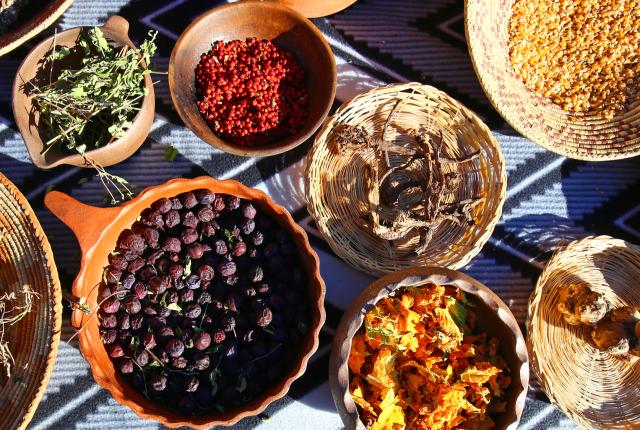Above: A sampler of traditional Native herbs, berries, and roots, gathered from the land.
Photograph courtesy of Toasted Sister.
DURING “ON THE PUEBLO BREAD TRAIL,” an episode of the Toasted Sister Podcast, host Andi Murphy asks Jemez baker Lyda Toya to describe how she tests the heat inside an horno. The beehive-shaped adobe oven was introduced by the Spanish in the mid-1500s, along with all the ingredients in Pueblo bread itself: flour, milk, and yeast. Toya says she places a corn husk in the wood-fired horno and if it comes out of the coals a certain hue of singed brown, she knows the heat is right.
New Mexico’s unique outdoor ovens are just one of the aha moments that Murphy is bringing to listeners across the U.S. and Canada. The Albuquerque-based foodie is also a producer for the national Native America Calling radio program, a freelance writer, and the one-woman force behind Toasted Sister, which focuses on Native American food, chefs, and culinary traditions. Since releasing the first episode in January 2017, she’s drawn raves from Uproxx, Cowboys & Indians magazine, and The New York Times. “That was pretty cool,” she says of the Times. “I’m not really used to people asking me questions and looking to me as some sort of expert or mouthpiece for this Native food movement. But my role is as a storyteller.”
Murphy is Diné, and, through her firsthand understanding of the cultural erasure that took place beginning with colonization, she wants to help indigenous people come back to their culinary history and traditions. That makes her part of a movement that’s gaining traction through Native-owned restaurants and back-to-basics growers throughout the nation. “I talk to chefs and farmers and foodies who are working for food sovereignty in Native communities and non-Native communities,” she says. “We never get the spotlight anywhere. It says a lot when I say, ‘Toasted Sister is the only podcast out there about Native food’ when there are thousands of podcasts about anything.”
Murphy creates every detail of Toasted Sister, down to the punky illustrations on the podcast’s web page. “I like the autonomy of it,” she says. “I like how I control everything, from the way it looks to the way it sounds to who is next to who I talk with, editing it ... everything.” Its title is a nod to the rock band Twisted Sister and, like Murphy’s taste for all-black clothing, doubles down on her bodacious point of view.
“Early on, when people were interviewing me, a common question was ‘So what is Native American food?’ My response was ‘I am not going to say it’s one thing for every single tribe in every region of the country, in South America and Canada and Alaska.’ Tribes from the Southwest have this large culinary basket of desert food. And it’s not the same as people in the Great Lakes or the Pacific Northwest. It’s definitely not fry bread, which is a controversy in itself. ”
In a match between fry bread and Murphy? We’re betting on the podcaster.

Listen Up: New Mexico podcasts worth tuning in to.
Dressed: The History of Fashion: Cassidy Zachary and April Calahan, who live in Corrales, dive into the history and culture behind clothes, including fashion in Paris, fashion’s role in film, and the history of glitter.
City on the Edge: Ty Bannerman and Mike Smith delve into Albuquerque’s quirkier side, along with its history, nearby ghost towns, and a few lost legends.
True Consequences : When Eric Carter-Landin was young, his older brother was murdered by an unknown killer. He produces and hosts this podcast focusing on crimes in New Mexico, including famous cold cases.
Broken Boxes: Artist and activist Ginger Dunnill highlights indigenous, mixed, queer, and women artists. Guests explore their inspirations and creative processes and share stories about their work.


